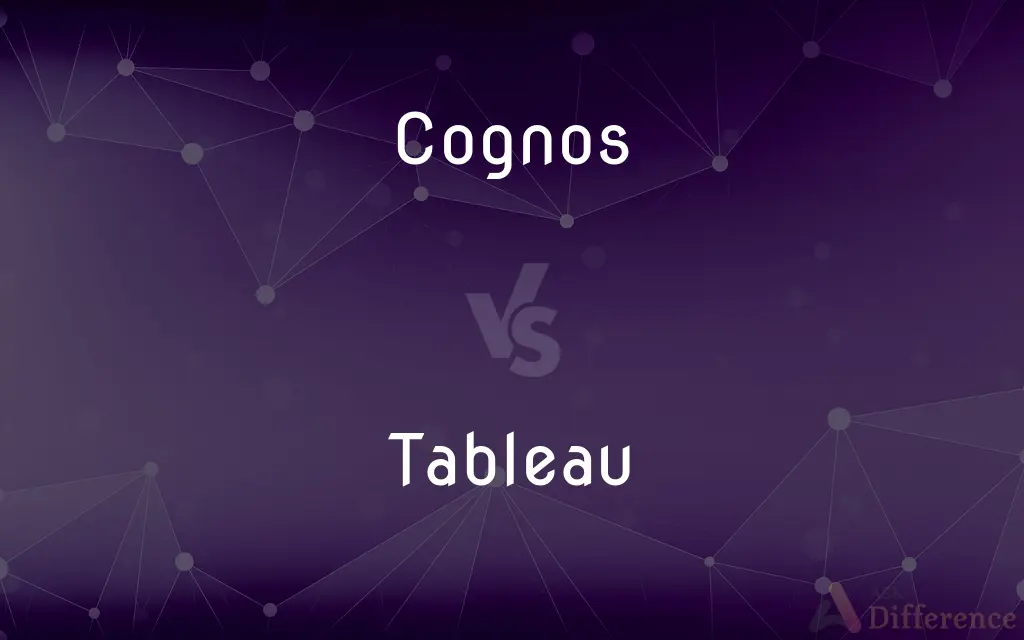Cognos vs. Tableau — What's the Difference?
By Tayyaba Rehman — Published on January 2, 2024
Cognos is an IBM enterprise business intelligence tool; Tableau is a data visualization software focused on user-friendly, interactive dashboards.

Difference Between Cognos and Tableau
Table of Contents
ADVERTISEMENT
Key Differences
Cognos, developed by IBM, is a comprehensive business intelligence (BI) suite that provides a wide range of functionalities including reporting, analytics, scorecarding, and monitoring of events and metrics. Tableau, on the other hand, is renowned for its data visualization capabilities, enabling users to create interactive and shareable dashboards. While Cognos offers robust enterprise-level solutions, Tableau focuses on making data visualization accessible to a broader audience.
Cognos is designed for large-scale deployments in enterprises and is well-suited for handling complex data sets and reporting requirements. It integrates well with corporate databases and offers a secure environment for data analytics. Tableau, however, excels in its ability to quickly generate visually appealing reports and dashboards, making it a favorite among users who prioritize ease of use and quick data interpretation.
In terms of user experience, Cognos has a more traditional, enterprise-focused interface that can handle detailed report generation but might have a steeper learning curve. Tableau is designed with a focus on user-friendliness, offering an intuitive drag-and-drop interface that allows users to easily explore and visualize data.
Cognos is often chosen by organizations that need comprehensive BI solutions and deep integration with their existing IT infrastructure. Tableau is preferred for its agility and the ability to quickly create impactful visualizations, making it popular in scenarios where speed and ease of data presentation are key.
In terms of data handling, Cognos supports a wide range of data sources and is known for its robust data processing capabilities. Tableau also supports various data sources but stands out in its ability to connect to data quickly and its emphasis on real-time data updates and sharing.
ADVERTISEMENT
Comparison Chart
Primary Function
Comprehensive business intelligence tool
Data visualization and dashboard creation
Target Users
Large enterprises for complex data analysis
Users needing quick, visually appealing reports
User Interface
Traditional, more complex
Intuitive, user-friendly
Data Handling
Robust data processing and reporting
Fast data connection and real-time updates
Integration with IT Systems
High, suitable for complex IT environments
Moderate, with focus on accessibility
Learning Curve
Steeper, due to complex functionalities
Easier for beginners and non-technical users
Reporting Capabilities
Detailed and comprehensive reporting
Quick, visually driven reporting
Visualization Capabilities
Standard visuals with in-depth analysis
Highly interactive and customizable visuals
Deployment
Often large-scale and enterprise-focused
Flexible, ranging from individual to enterprise
Data Source Compatibility
Broad compatibility with corporate databases
Wide range, emphasis on varied data connections
Compare with Definitions
Cognos
Cognos supports multi-dimensional data exploration.
Cognos allows us to drill down into sales data to understand trends.
Tableau
Tableau is a leading data visualization tool for creating interactive dashboards.
We used Tableau to create dashboards that visually represent our sales data.
Cognos
Cognos combines reporting, analysis, scorecarding, and monitoring of business metrics.
Cognos is instrumental in monitoring our key performance indicators.
Tableau
Tableau specializes in making complex data easily understandable.
Tableau transformed our complex datasets into easy-to-understand visuals.
Cognos
Cognos is used for enterprise-level reporting and analysis.
We integrated Cognos into our IT infrastructure for enhanced data analysis.
Tableau
Tableau is widely used for its ability to connect to various data sources.
Tableau's ability to connect to multiple data sources streamlined our reporting process.
Cognos
Cognos is an IBM business intelligence and performance management software.
Our company uses Cognos for detailed financial reporting.
Tableau
Tableau offers a user-friendly interface for data analysis.
With Tableau's drag-and-drop functionality, I could quickly analyze the marketing data.
Cognos
Cognos provides comprehensive data analytics solutions.
Cognos helped us analyze customer data across multiple channels.
Tableau
A vivid or graphic description
The movie was a tableau of a soldier's life.
Tableau
A striking incidental scene, as of a picturesque group of people
"New public figures suddenly abound in the hitherto faceless totalitarian tableaux" (John McLaughlin).
Tableau
An interlude during a scene when all the performers on stage freeze in position and then resume action as before.
Tableau
A tableau vivant.
Tableau
A striking and vivid representation; a picture.
Tableau
A vivid graphic scene of a group of people arranged as in a painting or bas relief sculpture.
Tableau
Hence, an arrangement of actors in static positions on stage, having the effect of pointing up a particular moment in the drama, conventionally revealed by opening tableau curtains (known as "tabs").
Tableau
(mathematics) A two-dimensional array or table of data, usually numbers, of various specific kinds.
Tableau
A table that shows constraint violations of a list of candidates given an input and a constraint ranking.
Tableau
(card games) Mostly in solitaire card games, but also in other card and board games, the main area, where random cards can be arranged.
Tableau
(logic) A semantic tableau.
Tableau
(theater) unit of a play, an opera or a ballet with change of stage setting.
Tableau
A striking and vivid representation; a picture.
Tableau
A representation of some scene by means of persons grouped in the proper manner, placed in appropriate postures, and remaining silent and motionless.
Tableau
The arrangement, or layout, of cards.
Tableau
A group of people attractively arranged (as if in a painting)
Tableau
Any dramatic scene
Tableau
Tableau enables real-time data updates for dashboards.
Our Tableau dashboards update in real-time, providing us with the latest information.
Common Curiosities
What is IBM Cognos used for?
IBM Cognos is used for enterprise-level business intelligence, including reporting, analysis, and performance management.
Does Cognos offer data visualization?
Yes, Cognos offers data visualization, but with more emphasis on traditional reporting and in-depth analysis.
What is Tableau primarily used for?
Tableau is primarily used for data visualization and creating interactive dashboards.
Can Cognos integrate with other IBM products?
Yes, Cognos integrates well with other IBM products and services, enhancing its enterprise utility.
Is Cognos suitable for small businesses?
Cognos can be over-complex for small businesses; it's more suited for large enterprises with extensive data analysis needs.
What types of companies use Cognos?
Large enterprises and organizations requiring comprehensive BI solutions typically use Cognos.
Can Tableau connect to SQL databases?
Yes, Tableau can connect to various SQL databases, along with other data sources.
Can Tableau handle large datasets?
Yes, Tableau can handle large datasets, but its performance may vary based on data complexity and system resources.
Is Tableau easy to learn for beginners?
Yes, Tableau is known for its user-friendly interface, making it easier for beginners to learn.
Does Tableau provide real-time data analysis?
Yes, Tableau offers capabilities for real-time data analysis and updates.
How does Tableau facilitate data exploration?
Tableau facilitates data exploration through its interactive and intuitive interface, allowing users to easily navigate and visualize data.
Is Cognos available in the cloud?
Yes, Cognos is available in both cloud-based and on-premises deployment options.
Can Cognos be used for predictive analytics?
Yes, Cognos has capabilities for predictive analytics, though it may require integration with other analytics tools.
What are the main advantages of Cognos?
The main advantages of Cognos are its comprehensive BI capabilities, in-depth analysis, and enterprise-level reporting.
Is Tableau suitable for non-technical users?
Yes, Tableau is suitable for non-technical users due to its emphasis on ease of use and intuitive design.
Share Your Discovery

Previous Comparison
COMMIT in SQL vs. ROLLBACK in SQL
Next Comparison
Simple Pendulum vs. Compound PendulumAuthor Spotlight
Written by
Tayyaba RehmanTayyaba Rehman is a distinguished writer, currently serving as a primary contributor to askdifference.com. As a researcher in semantics and etymology, Tayyaba's passion for the complexity of languages and their distinctions has found a perfect home on the platform. Tayyaba delves into the intricacies of language, distinguishing between commonly confused words and phrases, thereby providing clarity for readers worldwide.














































